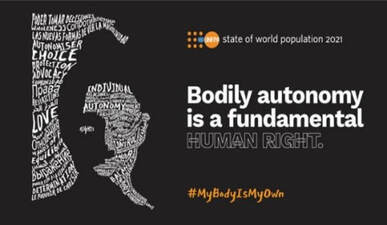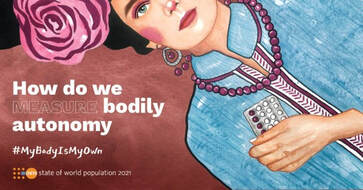
The parliamentarians for the 2030 agenda and UNFPA Brussels co-hosted the Belgian launch of UNFPA’s 2021 State of the World Population report that carries the meaningful title ‘My Body is Own’/ ‘Mon Corps m’Appartient’. UNFPA presented its report that discusses what bodily autonomy is and how we can measure it. It poses the question how we can achieve bodily autonomy for everyone.

A woman’s power to control her own body is linked to how much control she has in other spheres of her life. Gender inequalities in these other spheres have a huge impact on girls’ and women’s individual power and agency to make choices without fear or violence. Social norms, beliefs and stigma in their communities, as well as access to healthcare and socio-economic status are important determinants of women’s decision making power.
Only 55% of all women and girls in the world can make their own decisions about their bodily autonomy. This can result in early marriage, FGM, honour killings, marital rape and so on. All girls have the right to live free from bodily harm. This is enshrined in multiple international treaties and human rights law. The 2030 Agenda’s Sustainable Development Goal 5 has two targets that specifically seek to increase women’s decision-making power, focusing on informed decision-making and regulatory legal frameworks that guarantee full and equal access for women and men to sexual and reproductive healthcare, information and education.
For girls to achieve bodily autonomy, it is important they learn how their bodies function. Education is key and comprehensive sexuality education informs young people and teaches them about gender norms, respect and consent.
Target 5.6.2. shows how laws (and law-makers!) can have a significant impact on women’s rights, gender equality and sexual and reproductive health, but more reliable and complete information, broken down by location, income level, sex, age, ethnicity, ability and other variables to identify which groups and communities are being excluded is needed.
Catherine Gigante of DGD explained how support for bodily autonomy is included in Belgian development cooperation. Belgium has made it a priority to focus on gender mainstreaming and gender equality. They are seen as cross-cutting dimensions. Belgium has been supporting programmes that focus on tackling sexual and gender-based violence, child marriages and has started to work on male involvement and masculinities through the Belgian embassies. Belgium is also committed to achieving LGBTQI+ persons and unmarried women’s access to SRH services. In the upcoming Generation Equality Forum Paris Summit, 30 June - 2 July, Belgium will participate in the SRHR and bodily autonomy action coalition and the action coalition on sexual and gender-based violence, with specific commitments around the prevention of violence in the workplace and women, peace and security.
Irmine Ayihounton, member of the Young Feminist network of West Africa spoke about challenges women face in her region, where women’s decision-making power is very limited. “Girls often cannot say their body belongs to them. Often they do not even know it does.” The weight of cultural norms is heavy. “A young girl can enter the pharmacy to buy a condom, but the mere look of the pharmacist can make her change her mind and leave the shop with a box of paracetamol in her hands, out of fear of being judged.” Ayihounton explained the difficulties of being a feminist, since people see you as the one who comes to uproot their young women, and consider you a threat.
Karen De Wilde, trainer on sexual transgressive behaviour at Sensoa, shared her experiences with incidents of sexual transgressive behaviour at Belgian schools, where teachers and principals struggle with how best respond to different kinds of sexual behaviour that occur at school, such as sexting. Sensoa developed tools for educational and other sectors as to how to build a policy around this (Grenswijs) and the Sensoa flag system, that helps to respond in the most appropriate ways.
Only 55% of all women and girls in the world can make their own decisions about their bodily autonomy. This can result in early marriage, FGM, honour killings, marital rape and so on. All girls have the right to live free from bodily harm. This is enshrined in multiple international treaties and human rights law. The 2030 Agenda’s Sustainable Development Goal 5 has two targets that specifically seek to increase women’s decision-making power, focusing on informed decision-making and regulatory legal frameworks that guarantee full and equal access for women and men to sexual and reproductive healthcare, information and education.
For girls to achieve bodily autonomy, it is important they learn how their bodies function. Education is key and comprehensive sexuality education informs young people and teaches them about gender norms, respect and consent.
Target 5.6.2. shows how laws (and law-makers!) can have a significant impact on women’s rights, gender equality and sexual and reproductive health, but more reliable and complete information, broken down by location, income level, sex, age, ethnicity, ability and other variables to identify which groups and communities are being excluded is needed.
Catherine Gigante of DGD explained how support for bodily autonomy is included in Belgian development cooperation. Belgium has made it a priority to focus on gender mainstreaming and gender equality. They are seen as cross-cutting dimensions. Belgium has been supporting programmes that focus on tackling sexual and gender-based violence, child marriages and has started to work on male involvement and masculinities through the Belgian embassies. Belgium is also committed to achieving LGBTQI+ persons and unmarried women’s access to SRH services. In the upcoming Generation Equality Forum Paris Summit, 30 June - 2 July, Belgium will participate in the SRHR and bodily autonomy action coalition and the action coalition on sexual and gender-based violence, with specific commitments around the prevention of violence in the workplace and women, peace and security.
Irmine Ayihounton, member of the Young Feminist network of West Africa spoke about challenges women face in her region, where women’s decision-making power is very limited. “Girls often cannot say their body belongs to them. Often they do not even know it does.” The weight of cultural norms is heavy. “A young girl can enter the pharmacy to buy a condom, but the mere look of the pharmacist can make her change her mind and leave the shop with a box of paracetamol in her hands, out of fear of being judged.” Ayihounton explained the difficulties of being a feminist, since people see you as the one who comes to uproot their young women, and consider you a threat.
Karen De Wilde, trainer on sexual transgressive behaviour at Sensoa, shared her experiences with incidents of sexual transgressive behaviour at Belgian schools, where teachers and principals struggle with how best respond to different kinds of sexual behaviour that occur at school, such as sexting. Sensoa developed tools for educational and other sectors as to how to build a policy around this (Grenswijs) and the Sensoa flag system, that helps to respond in the most appropriate ways.

 RSS Feed
RSS Feed